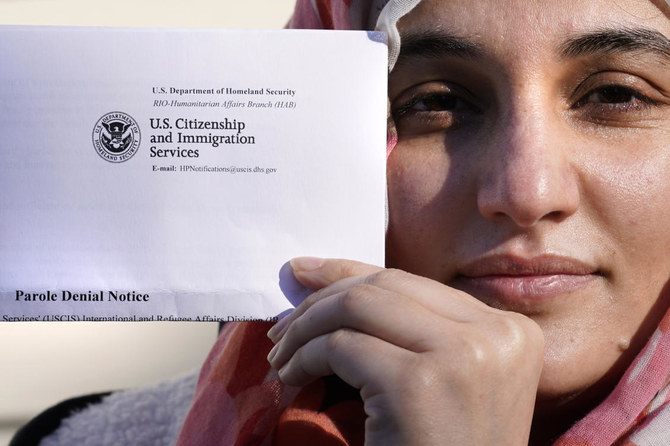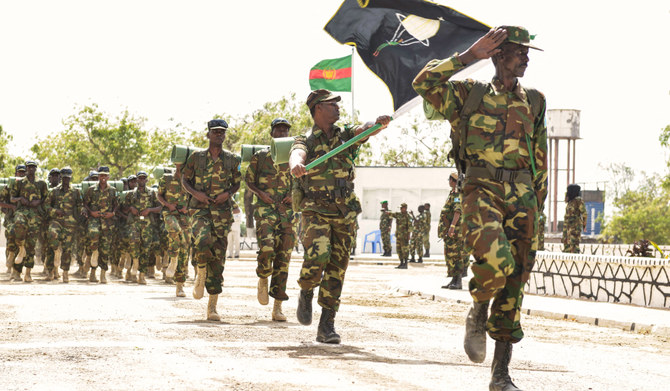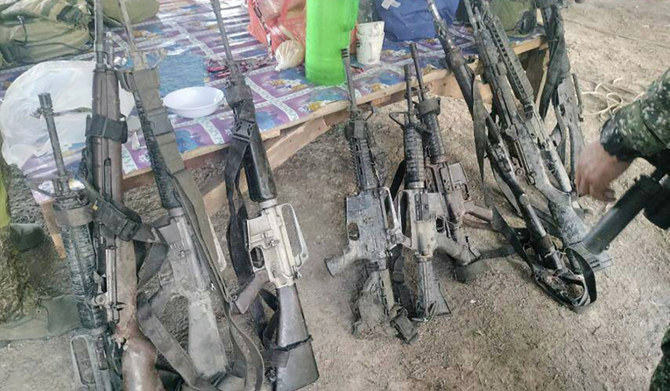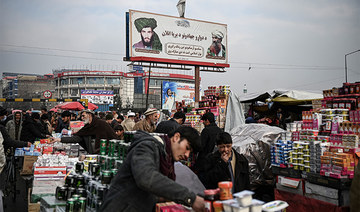BOSTON: Haseena Niazi had pinned her hopes of getting her fiancé out of Afghanistan on a rarely used immigration provision.
The 24-year-old Massachusetts resident was almost certain his application for humanitarian parole would get approved by the US government, considering the evidence he provided on the threats from the Taliban he received while working on women’s health issues at a hospital near Kabul.
But this month, the request was summarily denied, leaving the couple reeling after months of anxiety.
“He had everything they wanted,” said Niazi, a green card holder originally from Afghanistan. “It doesn’t make any sense why they’d reject it. It’s like a bad dream. I still can’t believe it.”
Federal immigration officials have issued denial letters to hundreds of Afghans seeking temporary entry into the country for humanitarian reasons in recent weeks, to the dismay of Afghans and their supporters. By doing so, immigrant advocates say, the Biden administration has failed to honor its promise to help Afghans who were left behind after the US military withdrew from the country in August and the Taliban took control.
“It was a huge disappointment,” said Caitlin Rowe, a Texas attorney who said she recently received five denials, including one for an Afghan police officer who helped train US troops and was beaten by the Taliban. “These are vulnerable people who genuinely thought there was hope, and I don’t think there was.”
Since the US withdrawal, US Citizenship and Immigration Services has received more than 35,000 applications for humanitarian parole, of which it has denied about 470 and conditionally approved more than 140, Victoria Palmer, an agency spokesperson, said this week.
The little-known program, which doesn’t provide a path to lawful permanent residence in the country, typically receives fewer than 2,000 requests annually from all nationalities, of which USCIS approves an average of about 500, she said.
Palmer also stressed humanitarian parole is generally reserved for extreme emergencies and not intended to replace the refugee admissions process, “which is the typical pathway for individuals outside of the United States who have fled their country of origin and are seeking protection.”
The US government, meanwhile, continues to help vulnerable Afghans, evacuating more than 900 American citizens and residents and another 2,200 Afghans since the military withdrawal. The state department said it expects to help resettle as many as 95,000 people from Afghanistan this fiscal year, a process that includes rigorous background checks and vaccinations.
Many of them, however, had been whisked out of Afghanistan before the US left. Now, USCIS is tasked with this new wave of humanitarian parole applications and has ramped up staffing to consider them.
The agency said in a statement that requests are reviewed on an individual basis, with consideration given to immediate relatives of Americans and Afghans airlifted out.
And while USCIS stressed that parole shouldn’t replace refugee processing, immigrant advocates argue that isn’t a viable option for Afghans stuck in their country due to a disability or hiding from the Taliban. Even those able to get out of Afghanistan, they say, may be forced to wait years in refugee camps, which isn’t something many can afford to do.
Mohammad, who asked that his last name not be used out of fear for his family’s safety, said his elder brother, who used to work for international organizations, is among them. He has been in hiding since the Taliban came looking for him following the US withdrawal, Mohammad said.
On a recent visit to the family home, Taliban members took his younger brother instead and held him more than a week for ransom, he said. Now, Mohammad, a former translator for US troops in Afghanistan who lives in California with a special immigration status, is seeking parole for this brother, too. He hopes a conditional approval letter can get them a spot on one of the US evacuation flights still running out of the country.
“I can provide him housing. I can provide him everything,” he said. “Let them come here.”
Immigrant advocates began filing humanitarian parole applications for Afghans in August in a last-ditch effort to get them on US evacuation flights out of the country before the withdrawal.
In some cases, it worked, and word spread among immigration attorneys that parole, while typically used in extreme emergencies, might be a way out, said Kyra Lilien, director of immigration legal services at Jewish Family & Community Services in California’s East Bay.
Soon, attorneys began filing thousands of parole applications for Afghans.
When the US immigration agency created a website specifically to address these applications, Lilien said she thought it was a sign of hope. By November, however, the agency had posted a list of narrow criteria for Afghan applicants and held a webinar telling attorneys that parole is typically granted only if there’s evidence someone faces “imminent severe harm.”
A few weeks later, the denial letters began arriving. Lilien has received more than a dozen but no approvals.
“Once the US packed up and left, anyone who was left behind has only one choice, and that is to pursue this archaic refugee channel,” she said. “It is just so angering that it took USCIS so long to be clear about that.”
Wogai Mohmand, an attorney who helps lead the Afghan-focused Project ANAR, said that the group has filed thousands of applications and that since the US troop withdrawal, has seen only denials.
The despair has led some immigration attorneys to give up on filing parole applications altogether. In Massachusetts, the International Institute of New England is holding off filing new applications until it hears on those that are pending after receiving a flurry of denials.
Chiara St. Pierre, an attorney for the refugee resettlement agency, said she feels clients like Niazi are facing an “unwinnable” battle.
For Niazi’s fiancé, they had provided copies of written threats sent to the hospital where he works as a medical technician and threatening text messages he said came from Taliban members, she said. It wasn’t enough.
A redacted copy of the denial letter provided by St. Pierre lists the USCIS criteria released in November but doesn’t specify why the agency rejected the application, which had been filed in August.
For now, Niazi says her fiancé is living and working far from Kabul as they weigh their options. They could potentially wait until Niazi becomes an American citizen so she can try to bring him here on a fiancé visa, but that would take years.
“He can’t wait that long. It’s a miracle every day that he’s alive,” Niazi said. “I’m feeling like every door is closing in on him.”
___
Taxin reported from Orange County, California.
Hundreds of Afghans denied humanitarian entry into US
https://arab.news/66y52
Hundreds of Afghans denied humanitarian entry into US

- Federal immigration officials have issued denial letters to hundreds of Afghans seeking temporary entry into the country for humanitarian reasons in recent weeks
- The despair has led some immigration attorneys to give up on filing parole applications altogether
Somalia detains US-trained commandos over theft of rations

- The US agreed in 2017 to help train and equip the 3,000-strong Danab to act as a quick-reaction strike force against Al-Shabab
MOGADISHU: Somalia’s government said it had suspended and detained several members of an elite, US-trained commando unit for stealing rations donated by the US, adding that it was taking over responsibility for provisioning the force.
The Danab unit has been a key pillar of US-backed efforts to combat the Al-Qaeda-linked militant group Al-Shabab. The US agreed in February to spend more than $100 million to build up to five military bases for Danab.
Somalia’s Defense Ministry said in a statement that it had notified international partners of the theft and would share the outcome of its investigation.
A US official said in a statement to Reuters that Washington takes all corruption accusations seriously.
“We look forward to engaging with the Danab on creating the necessary safeguards and accountability measures to prevent future incidents that could affect future assistance,” the official said, without directly addressing whether any US support had already been suspended.
The US agreed in 2017 to help train and equip the 3,000-strong Danab to act as a quick-reaction strike force against Al-Shabab.
The group has been waging an insurgency against the central government since 2006.
Danab has been heavily involved in a military offensive by the Somali military and allied clan militias since 2022 that initially succeeded in wresting swaths of territory from Al-Shabab in central Somalia.
However, the campaign has lost momentum, with the government-allied forces struggling to hold rural areas and Al-Shabab continuing to stage large-scale attacks, including in the capital Mogadishu.
Washington suspended some defense assistance to Somalia in 2017 after the military could not account for food and fuel.
The US also conducts frequent drone strikes targeting Al-Shabab militants.
Kenya flood death toll since March climbs to 70

- Tanzania Prime Minister Kassim Majaliwa said on Thursday that more than 200,000 people had been affected by the disaster, with 155 fatalities and 236 people injured
NAIROBI: The number of people killed in floods in Kenya due to heavier than usual rainfall since the start of the monsoon in March has risen to 70, a government spokesperson said on Friday.
In recent weeks, Kenya and other countries in East Africa — a region highly vulnerable to climate change — have been pounded by heavier-than-usual rainfall compounded by the El Nino weather pattern.
El Nino is a naturally occurring climate pattern typically associated with increased heat worldwide, leading to drought in some parts of the world and heavy rains elsewhere.
BACKGROUND
Kenyans have been warned to stay on alert, with the forecast for more heavy rains across the country in the coming days as the monsoon batters East Africa.
“The official tally of fellow Kenyans who regrettably have lost their lives due to the flooding situation now stands at 70 lives,” government spokesperson Isaac Mwaura said on X after torrential rains killed more than a dozen people in the capital, Nairobi, this week.
Mwaura said the government would issue a “comprehensive brief” following a meeting with the national emergency response committee after the extreme weather caused chaos across Nairobi this week, blocking roads and engulfing homes in slum districts. Kenyans have been warned to stay on alert, with the forecast for more heavy rains across the country in the coming days as the monsoon batters East Africa.
At least 155 people have died in neighboring Tanzania due to flooding and landslides.
Tanzania Prime Minister Kassim Majaliwa said on Thursday that more than 200,000 people had been affected by the disaster, with 155 fatalities and 236 people injured.
He said homes, property, crops, and infrastructure such as roads, bridges, railways, and schools had been damaged or destroyed.
In Burundi, one of the poorest countries on the planet, around 96,000 people have been displaced by months of relentless rains, the United Nations and the government said this month.
Meanwhile, the UN humanitarian response agency, OCHA, said in an update this week that in Somalia, the seasonal Gu rains from April to June are intensifying, with flash floods reported since April 19.
It said four people had been reportedly killed and more than 800 people affected or displaced nationwide.
Uganda has also suffered heavy storms that have caused riverbanks to burst, with two fatalities confirmed and several hundred villagers displaced.
Late last year, more than 300 people died in torrential rains and floods in Kenya, Somalia, and Ethiopia, just as the region was trying to recover from its worst drought in four decades that left millions of people hungry.
From October 1997 to January 1998, massive flooding caused more than 6,000 deaths in five countries in the region.
Jewish campaign group led by Gideon Falter cancels London march over safety concerns

- The Campaign Against Antisemitism says safety concerns forced it to call off its “Walk Together” march after receiving threats from ‘hostile actors’
- Last weekend, a video appeared to show police prevent ‘openly Jewish’ Falter from walking near a pro-Palestine protest but a longer version of the footage painted a different picture
LONDON: The organizers of a march in protest against antisemitism, planned for Saturday in London, “reluctantly” announced on Friday that they were canceling the demonstration.
The Campaign Against Antisemitism said it was forced by safety concerns to call off its “Walk Together” march, which was scheduled to coincide with the latest in a series of pro-Palestine marches in the British capital. The organization said it had expected thousands of people to take part but threats from “hostile actors” posed a safety risk.
“We have received numerous threats and our monitoring has identified hostile actors who seem to have intended to come to any meeting locations that we announced,” the CAA said.
“The risk to the safety of those who wished to walk openly as Jews in London tomorrow as part of this initiative has therefore become too great.
“We are no less angry about these marches than our Jewish community and its allies. We want to walk.”
The group added that it wants the Metropolitan Police not only to “manage marches” but “police” them.
Last weekend, a video that circulated on social media sparked controversy as it showed a confrontation between the CAA’s chief executive, Gideon Falter, and a Metropolitan Police officer who appeared to be preventing him from crossing the road in the vicinity of a pro-Palestine march in London because he was “openly Jewish” and his presence was “antagonizing.”
Falter, who was threatened with arrest if he did not leave the area, criticized the police for their actions during the incident and claimed there were now “no-go zones for Jews” in London amid a rise in antisemitic sentiment arising from Israel’s war on Gaza following the Oct. 7 attacks by Hamas.
Police chiefs apologized twice for the officer’s choice of words. However, a former senior police officer said on Monday that the initial, short version of the video most people saw online “did not fully represent the situation.”
A longer version showed the officer expressing concern about Falter’s actions because he appeared to be deliberately attempting to provoke the pro-Palestinian demonstrators.
Berlin police clear pro-Palestinian camp from parliament lawn

- Police dismantled tents, forcibly removed protesters and blocked the surrounding area to stop others arriving
- "The idea was to draw attention to that and ... to the German complicity and active enabling of the Israeli genocide in Gaza," the camp organizer, Jara Nassar, said
BERLIN: Berlin police on Friday began clearing a pro-Palestinian camp set up in front of the German parliament by activists demanding the government stop arms exports to Israel and end what they say is the criminalization of the Palestinian solidarity movement.
Police dismantled tents, forcibly removed protesters and blocked the surrounding area to stop others arriving.
The action followed clashes between demonstrators and police on US campuses and a blockade at Paris’s Sciences Po university, part of international protests to decry Israel’s military campaign in Gaza and Western support for Israel.
The Berlin camp ‘Besetzung Gegen Besatzung’ — ‘Occupy Against Occupation’ — began on April 8, coinciding with the start of International Court of Justice hearings in Nicaragua’s case against Germany for providing military aid to Israel.
“The idea was to draw attention to that and ... to the German complicity and active enabling of the Israeli genocide in Gaza,” the camp organizer, Jara Nassar, told Reuters.
Israel strongly denies accusations that its offensive in Gaza, which aims to destroy the Palestinian militant group Hamas, constitutes a genocide.
Nassar and a dozen protesters sat on the ground, chanting pro-Palestinian slogans and songs as police with loudspeakers called on them to leave.
“We look at what is happening in the US ... with admiration. There is no reason to believe we should stop now,” said Udi Raz, a PhD student at Berlin’s Free University and a member of the Jewish Voice association.
Raz, who wore a Jewish kippah with the Palestinian flag colors and held his phone in a live social media broadcast of the clearance, said Jewish activists had joined the camp and held a candle-lit Passover dinner there this week.
Police said the prohibition order for the camp, which had been granted authorization at the start of the protest, was due to repeated violations committed by some protesters, including the use of unconstitutional symbols and forbidden slogans.
“Protection of gatherings cannot be guaranteed at this point because public safety and order are significantly at risk,” police spokesperson Anja Dierschkesaid said, adding tents had to be moved daily under local regulations to maintain the lawn.
“For the German government, grass matters more than the lives of more than 40,000 innocent people in Gaza murdered by the Israeli military,” Raz said.
Philippine police kill an Abu Sayyaf militant implicated in 15 beheadings and other atrocities

- A confidential police report said that Abdulsaid had been implicated in at least 15 beheadings in Basilan, including of 10 Philippine marines in Al-Barka town in 2007 and two of six kidnapped Vietnamese sailors near Sumisip town in 2016
MANILA: Philippine forces killed an Abu Sayyaf militant, who had been implicated in past beheadings, including of 10 Filipino marines and two kidnapped Vietnamese, in a clash in the south, police officials said Friday.
Philippine police, backed by military intelligence agents, killed Nawapi Abdulsaid in a brief gunbattle Wednesday night in the remote coastal town of Hadji Mohammad Ajul on Basilan island after weeks of surveillance, security officials said.
Abu Sayyaf is a small but violent armed Muslim group, which has been blacklisted by the US and the Philippines as a terrorist organization for ransom kidnappings, beheadings, bombings and other bloody attacks. It has been considerably weakened by battle setbacks, surrenders and infighting, but remains a security threat particularly in the southern Philippines, home to minority Muslims in the predominantly Roman Catholic nation.
Abdulsaid, who used the nom de guerre Khatan, was one of several Abu Sayyaf militants who aligned themselves with the Daesh group.
A confidential police report said that Abdulsaid had been implicated in at least 15 beheadings in Basilan, including of 10 Philippine marines in Al-Barka town in 2007 and two of six kidnapped Vietnamese sailors near Sumisip town in 2016. The Vietnamese were seized from a passing cargo ship.
He was also involved in attacks against government forces in 2022 and a bombing in November that killed two pro-government militiamen and wounded two others in Basilan, the report said.
Abdulsaid was placed under surveillance in February, but police forces couldn’t immediately move to make a arrest because of the “hostile nature” of the area where he was eventually gunned down, according to the report.
On Monday, Philippine troops killed the leader of another Muslim rebel group and 11 of his men blamed for past bombings and extortion in a separate clash in a marshy hinterland in Datu Saudi Ampatuan town in southern Maguindanao del Sur province, the military said.
Seven soldiers were wounded in the clash with the members of the Bangsamoro Islamic Freedom Fighters.
The Abu Sayyaf and the Bangsamoro Islamic Freedom Fighters are among a few small armed groups still struggling to wage a separatist uprising in the southern Philippines.
The largest armed separatist group, the Moro Islamic Liberation Front, signed a 2014 peace pact with the government that eased decades of sporadic fighting.
Moro Islamic Liberation Front rebel commanders became parliamentarians and administrators of a five-province Muslim autonomous region in a transition arrangement after signing the peace deal. They are preparing for a regular election scheduled for next year.





















